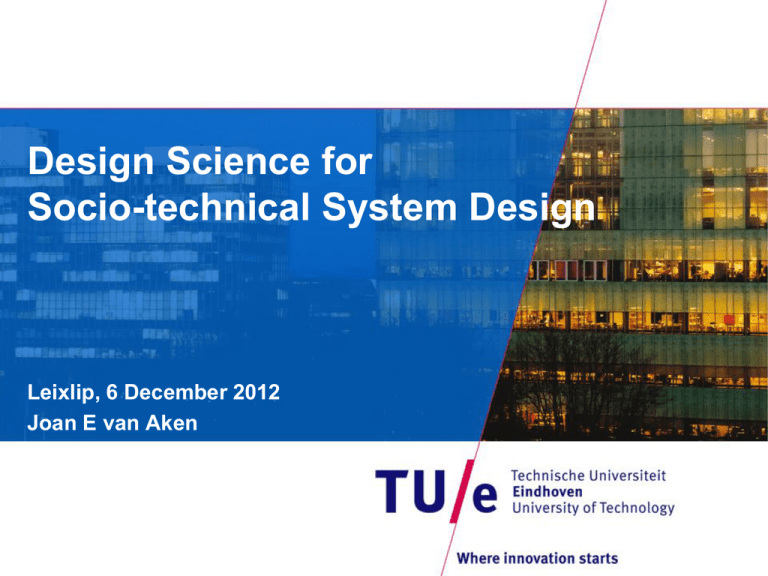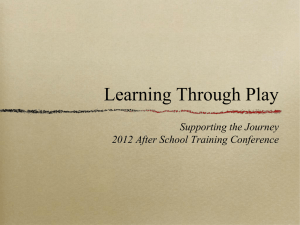De ingenieur in wonderland - Design Science Research Group
advertisement

Design Science for Socio-technical System Design Leixlip, 6 December 2012 Joan E van Aken content of presentation (1) Design science (DS): valid generic knowledge on how and what to design, produced by rigorous research Information systems are socio-technical systems, both technical and social components are important Developing DS for the social components is fundamentally different from developing DS for the technical ones, so paradigmatic issues are important Industrial Engineering and Innovation Sciences 6 Dec 2012 PAGE 1 content of presentation (2) Background: two research paradigm issues - design versus explanation (March & Smith, 1995) - design paradigm for the technical components of information systems, behavioural paradigm for the social ones (Hevner et al., 2004) Conclusion: behavioural science does not produce valid design knowledge for the social components of IT-systems Industrial Engineering and Innovation Sciences 6 Dec 2012 PAGE 2 question Question to the audience (please vote by raising your hand) ‘It is not possible to develop design science for the social components of information systems’ A. yes, not possible B. no, possible but not in a rigorous way C. yes, should be possible, but don’t know how D. yes, is possible and I know how to do it E. other Industrial Engineering and Innovation Sciences 6 Dec 2012 PAGE 3 content of presentation (3) 1. Introduction 2. Design science 3. Research paradigms design science versus explanatory science 4. Design science for social system design the issue of human agency and the basic research strategy 5. Design science research projects in management 6. Possible contributions conversations in information system research 7. Concluding remarks Industrial Engineering and Innovation Sciences 6 Dec 2012 PAGE 4 design science Science can be defined as a type of knowledge (scientia: Latin for knowledge) and as an academic discipline Design science on or for designing: descriptive and explanatory or supporting designing Design science for designing: valid knowledge on how and what to design, produced by rigorous research (both methodological and substantive knowledge; validity used here as a container concept) Rigorous: following the ‘rules of the game’, so adapted to the nature of research object and of research question Industrial Engineering and Innovation Sciences 6 Dec 2012 PAGE 5 social and technical system components Information system performance is critically dependent on the quality and coordination of both the technical and the social components of the system, so we need design science for both types of components The fundamental difference between both types: human agency (both a asset and a liability for the designer) Industrial Engineering and Innovation Sciences 6 Dec 2012 PAGE 6 objective of presentation The objective of this presentation: - to discuss the nature of design science research for social system design (in the field of organization and management) - to show how one can do so - to link this to IT-conversations Industrial Engineering and Innovation Sciences 6 Dec 2012 PAGE 7 research paradigms (1) Research paradigm, following Lakatos(1991): combination of research questions asked, research methodologies allowed (including what is accepted as evidence) and research products pursued March & Smith (1995) contrast the design and the ‘natural sciences’ paradigms Hevner et al. (2004) contrast the design and the behavioural science paradigms Industrial Engineering and Innovation Sciences 6 Dec 2012 PAGE 8 research paradigms (2) One can distinguish (van Aken, 2004, 2005) - the explanatory research paradigm (explanatory sciences like physics and sociology) - the design science research paradigm (design sciences, like medicine and engineering) Explanatory research: aims at understanding the world that is Design science research: aims at developing knowledge to create the world that can be Industrial Engineering and Innovation Sciences 6 Dec 2012 PAGE 9 research paradigms (3) Explanatory research (as used in e.g. in physics) - driven by pure knowledge problems; observer perspective (knowledge as an end) - mission: to understand, a quest for truth - students are trained to become researchers by researchers - iconic research product: the causal model Design science research (as in medicine and engineering) - driven by field problems, actor perspective (knowledge as a means) - mission: to improve the human condition - students are trained to become professionals largely by professionals - iconic research product: generic solution and the design proposition Industrial Engineering and Innovation Sciences 6 Dec 2012 PAGE 10 DSR research products (1) DSR produces many kinds of knowledge, but the iconic ones are is alternative generic solutions/interventions for types of field problems and design propositions The design proposition puts the generic solution into its context Industrial Engineering and Innovation Sciences 6 Dec 2012 PAGE 11 generic alternative solutions Examples of field problems for which generic alternative solutions have been developed in the field of management (by PhD-DSR-studies): - how to create an effective virtual team - how to find reliable overseas partners for cooperative arrangements (for SMEs) - how to involve end users in product innovation - how to promote intrapreneuring - how to deal with setbacks in radical innovation Industrial Engineering and Innovation Sciences 10 October 2012 PAGE 12 DSR research products (2) The design proposition gives the basic pragmatic logic “if you want to solve this type of problem-in-context, you may use this generic solution/intervention (which will produce the desired outcome through this mechanism)” A design proposition is not a prescription (in management research the term prescriptive or normative is a legacy from the time of the one best way of organizing) Industrial Engineering and Innovation Sciences 6 Dec 2012 PAGE 13 the design proposition (CIMO-logic) Prison problem C – locked door, bars, guards I – no escapes O – physical constraining of movements M Theft in car park C – introduction CCTV I – less theft O – deterrence, allocation of personnel, less careless behaviour of parkers M Distributed team C – FtF kick-off meeting I – effective team O – collective insight and collective commitment M Promotion of intrapreneurship C – gaming I – insight and commitment O – experiential learning M Industrial Engineering and Innovation Sciences 6 Dec 2012 PAGE 14 the methodological problem of DSR (1) The basic scientific claim of a design proposition is that the proposed solution/intervention will indeed produce in the given context the desired outcome So the question is how to establish this claim: one has to predict the outcomes of interventions The answer to this question produces the research strategy of DSR Industrial Engineering and Innovation Sciences 6 Dec 2012 PAGE 15 the methodological problem of DSR (2) In the material world this demand for prediction does not pose specific methodological problems, because in this world there are universal, invariant, individual behaviour determining mechanisms A machine, developed, produced and tested in Helsinki will also work next year in Barcelona Industrial Engineering and Innovation Sciences 6 Dec 2012 PAGE 16 the methodological problem of DSR (3) Because of human agency no universal, invariant and individual behaviour determining mechanisms in the social world This makes the prediction of the outcome of interventions in the social world difficult However, there are patterns and regularities in human behaviour Industrial Engineering and Innovation Sciences 6 Dec 2012 PAGE 17 research as experiential learning (1) Prediction of the behaviour of others is an almost universal human competence (without this competence intentional social behaviour would be almost impossible, as can be seen with autism) This competence is developed by personal experiential social learning The basic research strategy for DSR is experiential learning; more precisely objective and systematic experiential social learning through series of case-studies (developing and testing in context) Industrial Engineering and Innovation Sciences 6 Dec 2012 PAGE 18 research as experiential learning (2) Experiential learning is the basis for crafts and trade schools, including the business school of the past; this is not what we want Rigorous research as objective and systematic experiential learning can produce valid, objective generic knowledge It involves rigorous case studies, using methods like controlled observations, triangulation, rich descriptions, careful cross-case analyses, member checks, beta testing, etc. Industrial Engineering and Innovation Sciences 6 Dec 2012 PAGE 19 research as experiential learning (3) The basic process of designing consists of synthesis-evaluation iterations For the technical components of information systems the evaluation methods are quite similar to those of explanatory natural science Because of human agency this is not feasible for the social components; hence the strategy of objective and systematic experiential learning Question to the audience: do you feel that this strategy is an acceptable way to develop design science? Yes / no / don’t know yet Industrial Engineering and Innovation Sciences 6 Dec 2012 PAGE 20 DSR-projects (1) Donald Schön (1983) makes a distinction between the swamp of practice and the high ground of theory The challenge of DSR is to provide some firm ground in the swamp In DSR one works alternately in the ‘practice stream’ and the ‘knowledge stream’ Industrial Engineering and Innovation Sciences 6 Dec 2012 PAGE 21 DSR-projects (2) In the practice stream (the swamp) one develops specific solutions for (series of comparable) specific field problems, interacting with stakeholders and other practitioners (e.g. collaborative research) In the knowledge stream (the high ground) one develops generic solution oriented knowledge by generalizing across cases, interacting with other researchers (experiential learning: developing generic knowledge by using the experiences of working in the practice stream ) Industrial Engineering and Innovation Sciences 6 Dec 2012 PAGE 22 DSR-projects (3) This can be regarded as a type of Action Research (for which there is ample methodological literature) or Action Design Research (Sein et al.,2011) In DSR there is an emphasis on - developing generic knowledge through multiple cases - on the basis of a clear and generic problem statement DSR-projects typically have an explanatory/diagnostic phase, followed by a design science one Industrial Engineering and Innovation Sciences 2 Nov 2012 PAGE 23 DSR-projects (4) Solutions/interventions, developed by DSR, are to improve organizational performance, but effects on ‘the bottom line’ are always difficult to prove Rigorous design research typically develops a solution/intervention/system to realize a desired direct outcome Where available, explanatory research outcomes can link this direct outcome with the desired final outcome Industrial Engineering and Innovation Sciences 2 Nov 2012 PAGE 24 DSR-projects (5) Further rigour is obtained by testing in the intended field of application Alpha-testing by the designers, beta testing by third parties Further support can be obtained by peer reviews and user reviews The key issue remains: does the system (on average!) produce the outcomes that are claimed Industrial Engineering and Innovation Sciences 6 Dec 2012 PAGE 25 linking to IS-research (1) A well-known information system research process: build evaluate theorize justify (March and Smith, 1995) Under certain conditions this may be regarded as objective and systematic experiential social learning These conditions include - not one case but multiple comparable cases - ‘theorizing’ means generalizing across cases - ‘justification’ means rigorous field-testing Industrial Engineering and Innovation Sciences 6 Dec 2012 PAGE 26 linking to IS-research (2) A well-known set of IS- research products constructs models methods instantiations (March and Smith, 1995) Just ‘instantiations’ may be useful for purely technical systems (to the extent that one may abstract from the context-dependency of performance) Research products for socio-technical design research rather ‘type of systems’ and corresponding design propositions, tested across various contexts Industrial Engineering and Innovation Sciences 6 Dec 2012 PAGE 27 conclusions The social components of information systems differ fundamentally from the technical ones The main reason: human agency A research strategy based on objective and systematic experiential social learning can produce valid design science for these components Industrial Engineering and Innovation Sciences 6 Dec 2012 PAGE 28





